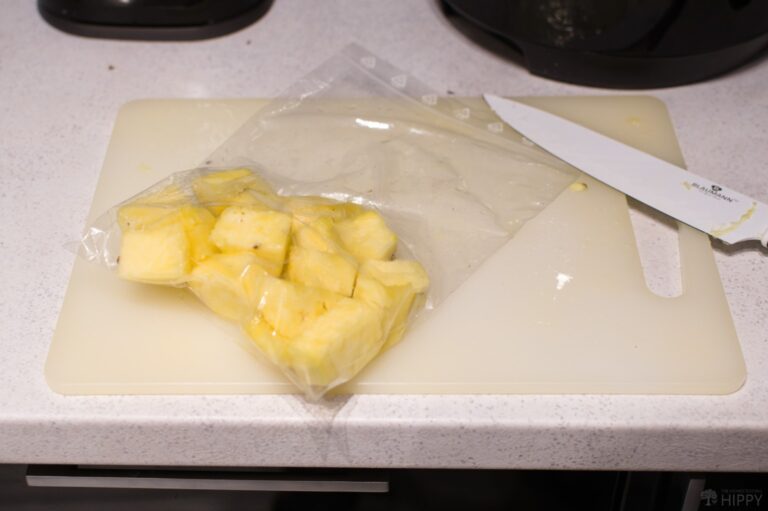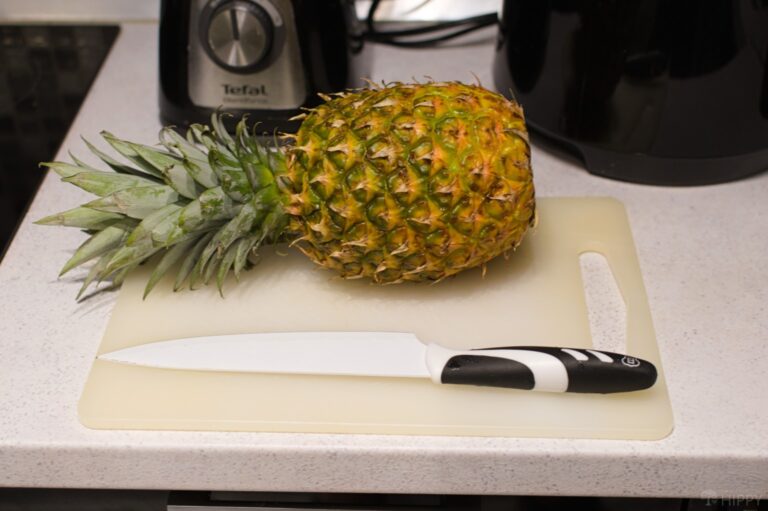There is hardly anything more wonderful than a piece of perfectly ripe fruit. The only downside is you have such precious little time to enjoy it before it spoils…. but, if you freeze your fruit you’ll have many extra months in which to eat it.

This is perfect for maximizing the returns on your own harvest or preventing waste of store-bought produce.
But, you’re only going to get the best results and maintain the best flavor if you know how to freeze any given kind of fruit. Getting it wrong means it might be horribly freezer burned or just not taste very good after it thaws.
How about pineapple? Is it possible to freeze pineapple?
Yes, you can freeze pineapple when it is ripe. You should core and peel your ripe pineapple before cutting it into discs, wedges, planks, or crushing it prior to freezing.
Pineapple is among the most popular and certainly one of the most delectable tropical fruits, and if you know how to freeze it there is no reason you can’t enjoy it even when it isn’t at the peak of the season.
This article will tell you what you need to know if you want to freeze your pineapple successfully.
Nutritional Value of Pineapple
There is no debating that pineapple is the king of tropical fruits, and not just based on popularity alone around the world.
The sublime, unique flavor of pineapple is incredibly sweet and almost indescribable, and that has seen its use in every kind of cuisine.
But what you might not know is that pineapple is also something of a nutritional powerhouse.

Pineapple has a great assortment of vitamins and minerals, and among those vitamins, we find most of the B-complex vitamins present, including B1, B2, B3, B5, B6, and folate along with a ton of vitamin C, with just a few ounces of pineapple containing more than half of the daily recommended value.
The mineral content of pineapple, while not quite as impressive as the vitamins, is still worthy of note, with that same size portion containing about 44% of the daily value of manganese and far smaller amounts of calcium, iron, magnesium, phosphorus, potassium, and zinc.
Pineapple also contains a trace amount of sodium and is 86% Water by weight.
And, of course, pineapples are packed with sugar in the form of fructose, with a 3 ½ portion containing on average nearly 10 grams of sugar and about one and a half grams of fiber.
What You Should Know About Freezing It
Lots of fruits and veggies, even those at the peak of freshness, benefit from special preparation prior to freezing.
Sure, I guess you could just throw a whole pineapple, crown and all, in your freezer like some kind of maniac but I wouldn’t expect it to come out the other side tasting very good.
Luckily, the best approach for pineapple has long been figured out by the National Center for Home Food Preservation.
The NCHFP recommends preparing pineapple at the peak of ripeness first by peeling it and removing the core and any “eyes” on the surface of the flesh.
Then all you need to do is either slice it into wedges, slices, or planks, or alternately crush it into a puree.
Once that is done, pack the pineapple into any suitable freezer container of your choosing.
You don’t need to add any sugar because it already has plenty of it, but do make sure you leave a little bit of “headspace” in the container.
Headspace refers to the leftover room for the moisture present in the pineapple to expand when it freezes. If you fail to leave headspace, your container might burst!
But once you have everything all set, put your pineapple in the freezer and you’re done.
Can You Freeze Pineapple When Raw?
Yes, you can freeze raw pineapple.
Can You Freeze Pineapple When Cooked?
You can freeze cooked pineapple, but it generally doesn’t do as well as raw, ripe pineapple.
How Long Does Pineapple Take to Freeze?
How long your pineapple takes to freeze is entirely dependent on how you prepared it, specifically how large the individual pieces are.
Small slices or wedges will probably freeze solid in a few hours. Crushed pineapple will generally freeze quickly, but if it is in a larger container with a lot of liquid expect it to take three or more hours.
How Long Will My Pineapple Keep When Frozen?
Surprisingly, pineapple keeps a very long time in the freezer and can remain good the entire time so long as it is protected from freezer burn. More on that in a minute.
You should expect your pineapple, when ripe, to last 10 to 12 months in the freezer according to foodsafety.gov.
Will Pineapple Get Freezer-Burned?
Yes, pineapple can get freezer burn like all other foods. However, it isn’t quite as vulnerable to freezer burn as you might think considering how juicy it is, and taking a few simple steps can further protect it. I’ll tell you how in the next section.
What’s the Best Way to Prevent Freezer Burn?
Preventing freezer burn is mostly done by protecting your pineapple from air, and also keeping your freezer really, really cold.
One of the biggest culprits when it comes to freezer burn is simply the presence of air in the container with your food.
If you can minimize the airspace in the container, you will greatly delay the onset of freezer burn.
This is done by packing the pineapple as tightly as you can in a hard container, or squeezing out as much of the air as possible from a bag. If you have a vacuum sealer, now’s the time to use it.
Second, turn your freezer down as low as it will go, and make 0°F Fahrenheit your target number. Somewhat counterintuitively, colder temperatures reduce the likelihood that freezer burn will occur.
On that note, try to minimize how often you open up your freezer, and when you do get what you need and shut it right away: letting in warm, moist air will facilitate freezer burn for everything inside.
And that’s pretty much it. A few simple, common sense steps can keep your pineapple freezer-burn free for the duration.
How Can You Tell When Pineapple Is No Longer Good?
You’ll know your pineapple is no longer good to eat when it turns soggy, slightly slimy, and has a tangy, almost bitter, taste to it after thawing.
This will happen if you leave your pineapple in the freezer way too long, or if you didn’t prepare it properly prior to freezing.
I should point out that, assuming your pineapples were unspoiled when you froze them, it’s still probably safe to eat in such a state it’s just not going to taste very good, and definitely won’t taste like the marvelously ripe fruit it was before you put it in the freezer.
Can You Refreeze Pineapple Safely?
You can refreeze your pineapple, but the results are not going to be very good the next time you thaw it out.
Freezing any fruit, especially one that is as juicy as pineapple, tends to cause damage to the structure of the flesh.
Pineapple, surprisingly, will survive this process once with very little ill effect. A second time, however, not so much.
To be clear this can be done safely, but it’s definitely going to affect the taste and texture. Try to make it a point to use your previously frozen pineapple up when you thaw it the first time.
What’s the Best Way to Defrost Pineapple?
You can try to defrost pineapple in the microwave, but I don’t recommend it. It will defrost unevenly and some pieces will begin to cook before others are even warmed up to room temperature. It’s a no-go.
Instead, your best bet is to place the pineapple in a large zipper bag and then place that in a bowl of cold water. Cold water, not hot!
This will only take about an hour, perhaps more, and your pineapple should be thawed enough to eat or use for whatever purpose you had in mind.
If you don’t want to mess with that or if you have more time, simply place the frozen pineapple in the refrigerator and give it a couple of days to thaw out normally.
Tom has built and remodeled homes, generated his own electricity, grown his own food and more, all in quest of remaining as independent of society as possible. Now he shares his experiences and hard-earned lessons with readers around the country.
Find out more about the team here.
